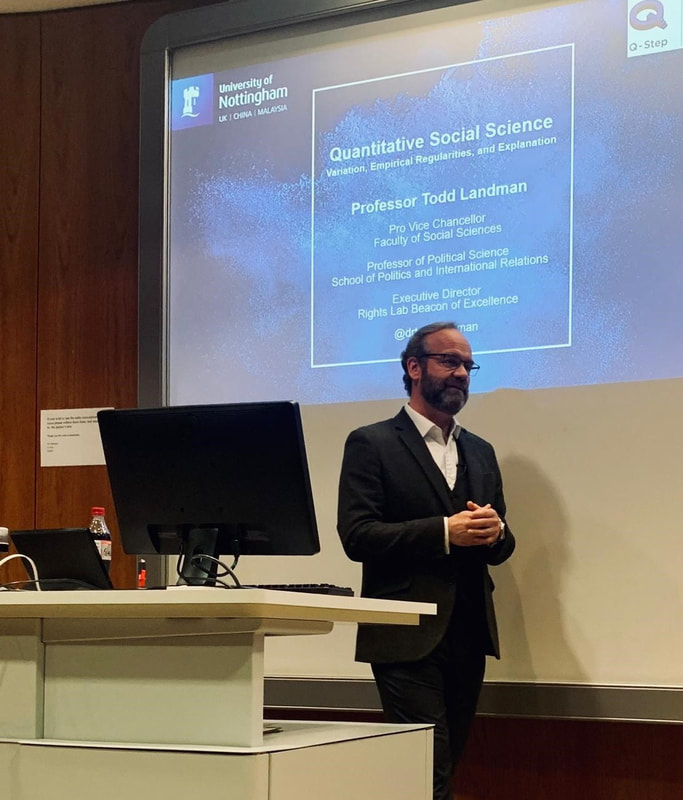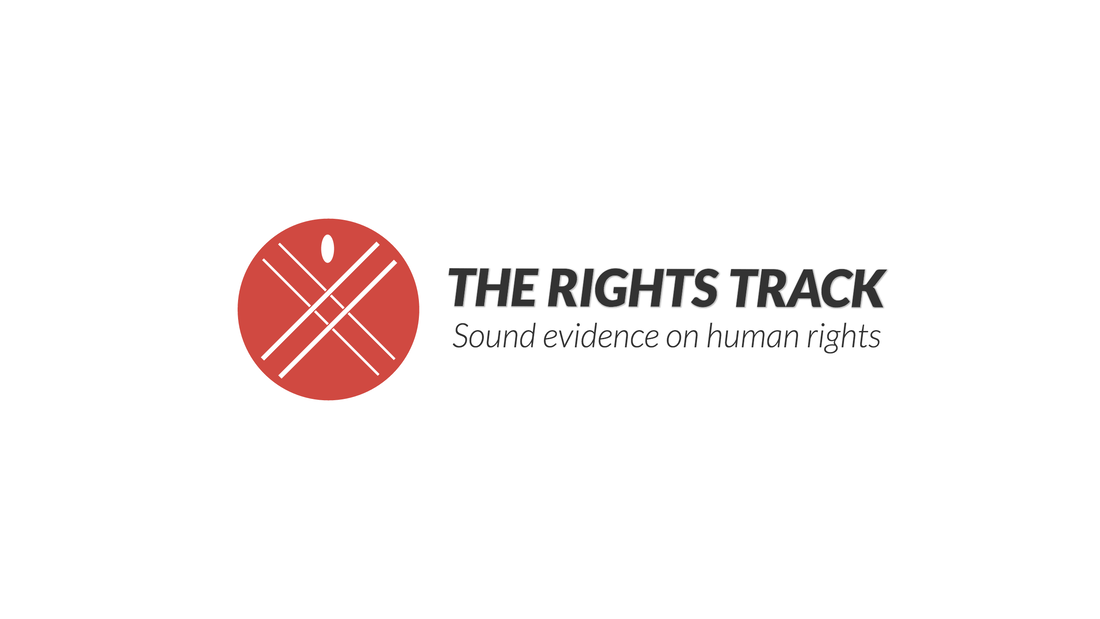Todd Landman's research career is best encapsulated by what he calls ‘rigorous morality’: a commitment to transparent empirical research that produces outputs of demonstrable public value and seeks “to make social (and political) science matter.” This concept has underpinned his systematic analysis to human rights problems (as published in International Studies Quarterly, Human Rights Quarterly, British Journal of Political Science, Political Geography, World Development, Spatial Economic Analysis, Democratization, Nature Humanities and Social Science Communications, Journal of Human Trafficking, Politics and Governance, Journal of Risk Research, Oxford University Press, Georgetown University Press, Sage Publications, Polity Press, Bloomsbury, Anthem Press, Edward Elgar, Lynne Reiner, and Routledge).
He has been an active researcher since 1991 when he started his PhD at the University of Colorado. He was a research assistant on a Nicaraguan elections project with Professor Leslie Anderson and a research associate with the Long Range Analysis of War (LORANOW) project with Professor Claudio Cioffi-Revilla (which yielded a publication in International Studies Quarterly on the Mayan city-state system). He was recruited to the United Kingdom in 1993 for a project on citizenship rights and social movements funded by the UK Economic and Social Research Council (ESRC) at the University of Essex (which yielded a co-authored research monograph with Professor Joe Foweraker published by Oxford University Press) and numerous other publications in peer-reviewed political science journals.
These formative research experiences led to a 22-year research career at the University of Essex, where he focused on the systematic comparative analysis of problems in development, democracy and human rights. He is a problem-based researcher who focuses on global challenges, comparative political methodology, and measurement and analysis of individual, sub-national, and country-level data. This work has yielded numerous peer-reviewed journal articles, research monographs (e.g. Protecting Human Rights published by Georgetown University Press), textbooks (e.g. four editions of Issues and Methods in Comparative Politics published by Routledge), reports, evaluations, and other knowledge products for a wide variety of international governmental and non-governmental organizations.
His research and associated publications brought the study of human rights into mainstream political science, where for over ten years he held leadership positions within the Human Rights Section of The American Political Science Association (2001-2013). His research has been funded through a variety of external sources including UK research councils, charitable foundations and trusts, national governments (e.g. Canada, Mexico, Mongolia, the Netherlands, Sweden, and the United Kingdom), the European Commission, private companies, the United Nations, and the International Institute for Democracy and Electoral Assistance. He has secured over £11 million in external research income at Essex and Nottingham. He is the Senior Independent Member of Council of the ESRC.
In the research environment of the United Kingdom, his work has featured as a regular submission to the Research Assessment Exercise (2000 and 2008) and the Research Excellence Framework (2014 and 2021), where he has contributed 4* publications and 4* impact case studies.
His development of the political science of human rights at Essex has now been applied at the University of Nottingham to the problem of modern slavery through the Rights Lab, which is a University Research Beacon of Excellence. He has a number of 4* publications and a 4* impact case study for the 2021 Research Excellence Framework.
His current work includes projects on analysing 'what works' in the struggle against modern slavery, a cost benefit analysis of UK support for survivors of modern slavery, the application of earth observation techniques to mapping sites of modern slavery in South Asia's 'brick kiln' industry, the application of machine learning to modern slavery prevalence estimation, assessment of modern slavery prevalence estimation techniques for the US State Department Trafficking in People (TIP) Office, an assessment of European policy instruments for combatting modern slavery in third countries, developing a methodological framework for estimating the prevalence of on-line child sexual exploitation in the Philippines, modelling the relationship between international trade and modern slavery, and a comparative study of anti-slavery organisations.
His work has been attractive to a wide range of international governmental and non-governmental organizations for its applicability to real world problems. He has travelled to over 50 countries to work on the measurement of analysis of democracy and human rights and now his applied work on modern slavery has led to a leadership role in the Rights Lab.
He his engaged in research leadership, supervising PhD students, mentoring early career researchers, reverse mentoring, and has a particular focus on research excellence through the lens of equality, diversity, and inclusion.
Working globally and collaboratively to deliver research that demonstrates ‘rigorous morality,’ he has forged a successful and productive research career in the United Kingdom alongside increasingly senior leadership roles (e.g., Executive Dean of the Social Sciences at the University of Essex, 2013-2015 and Pro Vice Chancellor of Social Sciences at the University of Nottingham, 2015-2023). He has remained research active throughout his career and has led through collaboration, publication, income generation, and high-quality international impact. He remains committed to academic freedom and empirical research that has real world application and is grounded in strong social science theories and methods.
His research on human rights and modern slavery features through his hosting The Rights Track, a podcast that provides sound evidence on human rights. The lessons and insights from the first six years of the podcast appear in The Rights Track: Sound Evidence on Human Rights and Modern Slavery (with Christine Garrington, New York and London: Anthem Press, June 2022).
He lives in the historic Park Estate in Nottingham.
He has been an active researcher since 1991 when he started his PhD at the University of Colorado. He was a research assistant on a Nicaraguan elections project with Professor Leslie Anderson and a research associate with the Long Range Analysis of War (LORANOW) project with Professor Claudio Cioffi-Revilla (which yielded a publication in International Studies Quarterly on the Mayan city-state system). He was recruited to the United Kingdom in 1993 for a project on citizenship rights and social movements funded by the UK Economic and Social Research Council (ESRC) at the University of Essex (which yielded a co-authored research monograph with Professor Joe Foweraker published by Oxford University Press) and numerous other publications in peer-reviewed political science journals.
These formative research experiences led to a 22-year research career at the University of Essex, where he focused on the systematic comparative analysis of problems in development, democracy and human rights. He is a problem-based researcher who focuses on global challenges, comparative political methodology, and measurement and analysis of individual, sub-national, and country-level data. This work has yielded numerous peer-reviewed journal articles, research monographs (e.g. Protecting Human Rights published by Georgetown University Press), textbooks (e.g. four editions of Issues and Methods in Comparative Politics published by Routledge), reports, evaluations, and other knowledge products for a wide variety of international governmental and non-governmental organizations.
His research and associated publications brought the study of human rights into mainstream political science, where for over ten years he held leadership positions within the Human Rights Section of The American Political Science Association (2001-2013). His research has been funded through a variety of external sources including UK research councils, charitable foundations and trusts, national governments (e.g. Canada, Mexico, Mongolia, the Netherlands, Sweden, and the United Kingdom), the European Commission, private companies, the United Nations, and the International Institute for Democracy and Electoral Assistance. He has secured over £11 million in external research income at Essex and Nottingham. He is the Senior Independent Member of Council of the ESRC.
In the research environment of the United Kingdom, his work has featured as a regular submission to the Research Assessment Exercise (2000 and 2008) and the Research Excellence Framework (2014 and 2021), where he has contributed 4* publications and 4* impact case studies.
His development of the political science of human rights at Essex has now been applied at the University of Nottingham to the problem of modern slavery through the Rights Lab, which is a University Research Beacon of Excellence. He has a number of 4* publications and a 4* impact case study for the 2021 Research Excellence Framework.
His current work includes projects on analysing 'what works' in the struggle against modern slavery, a cost benefit analysis of UK support for survivors of modern slavery, the application of earth observation techniques to mapping sites of modern slavery in South Asia's 'brick kiln' industry, the application of machine learning to modern slavery prevalence estimation, assessment of modern slavery prevalence estimation techniques for the US State Department Trafficking in People (TIP) Office, an assessment of European policy instruments for combatting modern slavery in third countries, developing a methodological framework for estimating the prevalence of on-line child sexual exploitation in the Philippines, modelling the relationship between international trade and modern slavery, and a comparative study of anti-slavery organisations.
His work has been attractive to a wide range of international governmental and non-governmental organizations for its applicability to real world problems. He has travelled to over 50 countries to work on the measurement of analysis of democracy and human rights and now his applied work on modern slavery has led to a leadership role in the Rights Lab.
He his engaged in research leadership, supervising PhD students, mentoring early career researchers, reverse mentoring, and has a particular focus on research excellence through the lens of equality, diversity, and inclusion.
Working globally and collaboratively to deliver research that demonstrates ‘rigorous morality,’ he has forged a successful and productive research career in the United Kingdom alongside increasingly senior leadership roles (e.g., Executive Dean of the Social Sciences at the University of Essex, 2013-2015 and Pro Vice Chancellor of Social Sciences at the University of Nottingham, 2015-2023). He has remained research active throughout his career and has led through collaboration, publication, income generation, and high-quality international impact. He remains committed to academic freedom and empirical research that has real world application and is grounded in strong social science theories and methods.
His research on human rights and modern slavery features through his hosting The Rights Track, a podcast that provides sound evidence on human rights. The lessons and insights from the first six years of the podcast appear in The Rights Track: Sound Evidence on Human Rights and Modern Slavery (with Christine Garrington, New York and London: Anthem Press, June 2022).
He lives in the historic Park Estate in Nottingham.


